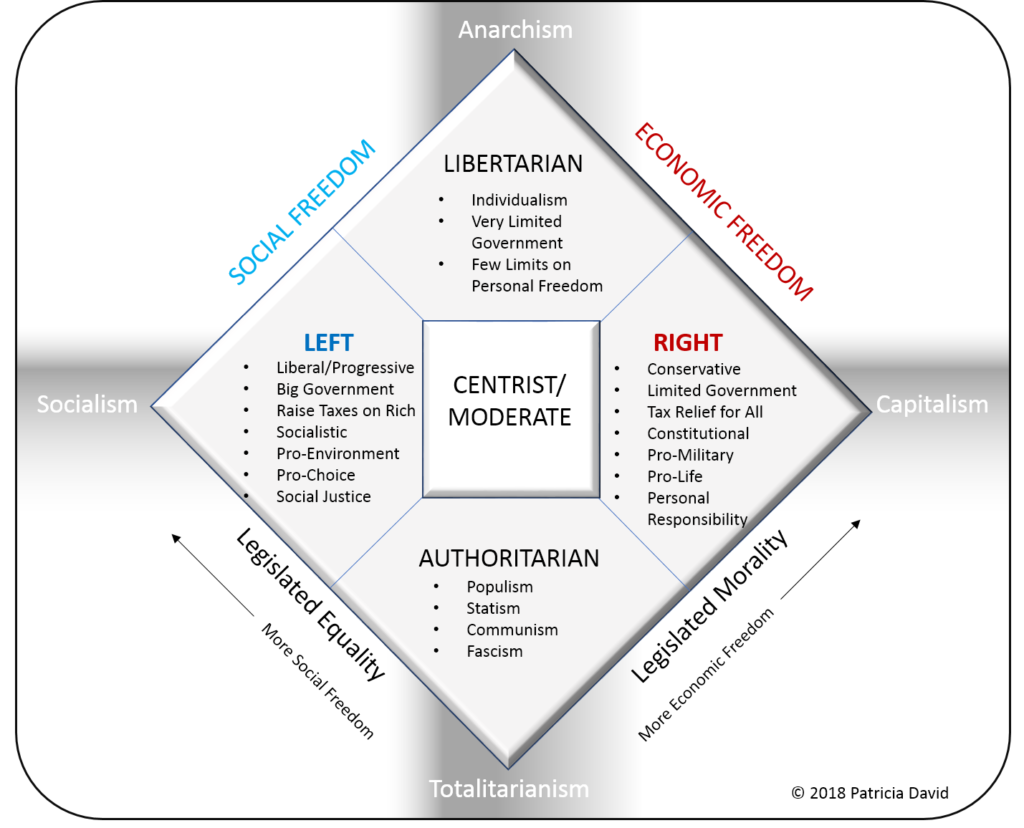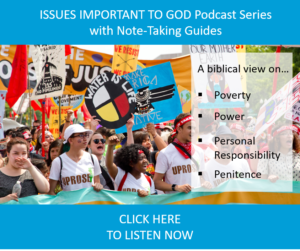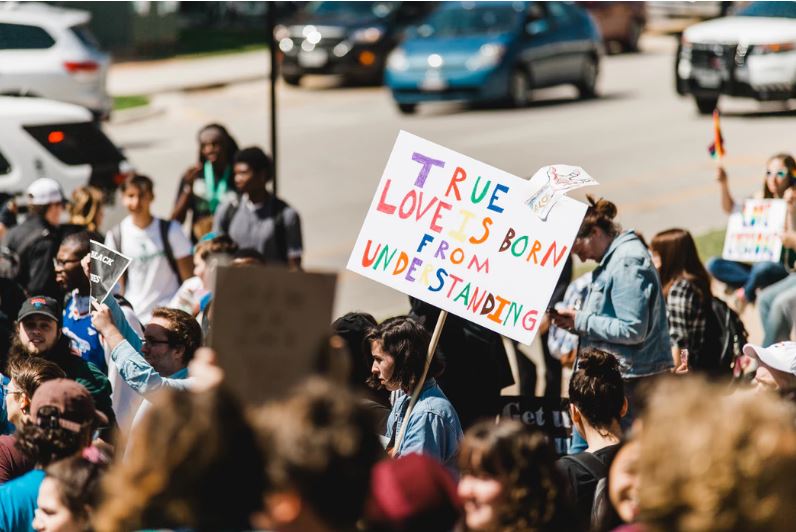Probably to 80% of you who are reading this post, the answer is obvious. A year or two ago, I read a Facebook post by a prominent leader in my denomination that said something like this, “This morning I had breakfast and a great conversation with a colleague. This is the first time I’ve ever entertained the possibility that someone could be both a Christian and a Republican.” I found it amusing, because, from my perspective, I was having a hard time understanding how anyone could be a Christian and a Democrat. So, for some of you, your mind is already made up. But for the 20% of you who are still wondering (and still reading), let me see if I can give you some food for thought.
What the Bible really has to say on this topic…
Here is the only Scripture passage you need in order to answer this question: Joshua 5:12-14. The Israelites had just entered the Promised Land and were en route to Jericho for their first major battle in their new homeland. The manna from heaven, which had sustained them throughout their 40 years of wandering in the barren wilderness of the Sinai Peninsula, had just ceased because they were now eating from the land of Canaan. It’s a new era for the Israelites. As Joshua neared Jericho, he encountered a man (an angel?) standing in front of him with a drawn sword. Joshua’s question is the one that we all tend to ask, “Are you for us or for our enemies?” And the answer? “Neither.” I love that! When you’re reading this passage, you’re expecting this “commander of the army of the Lord” to say, “I’m on your side, of course.” After all, Joshua and the army of Israel are the heroes in the story. But God sees the affairs of men – even those He is purposely orchestrating – in a different light from what most of us see. The question was never, “Whose side is God on?” but, “Who’s on God’s side?”
So, I’m going to go right on record here and say that God is not a Democrat. And He’s not a Republican. He’s not on either of their sides. But it is certainly appropriate (and necessary) to ask, “Who is on God’s side?”
The Difference Between Democrats and Republicans
If you’re not politically savvy, there’s a great chart that can help you understand the differences between the political parties. It’s called the Nolan Chart. Since so many people have created their own charts based on the Nolan Chart, I’ve created my own version below.

As you can see from the chart, Republicans tend to favor economic freedom (while advocating for more social regulation) and Democrats tend to favor social freedom (while advocating for more economic regulation). Republicans tend to tout the benefits of capitalism and the power of the free market and individuals to uplift society while Democrats tend to tout the benefits of socialism (or at least social programs that help the poor) and the power of the government to alleviate social ills. Republicans tend to want smaller government and lower taxes, while Democrats tend to want more government and higher taxes (at least on those they consider “rich”).
The real usefulness of this chart is to show that political differences fall on a continuum. Very rarely is one person all in for a party’s political platform. In fact, this is where a lot of friction enters discussions. We tend to create a caricature of the opposing party’s adherents and then throw out our arguments against that fictionalized rendering. This is what’s called a “straw man argument.” We create a scarecrow (straw man) that looks like what we think the other side believes, and then we fight against or argue against that straw man. But no one generally believes what your straw man believes, so you find yourself fighting against an imaginary person who doesn’t really exist in the real world. So, when someone from the Left enters a discussion thinking the person on the right is a greedy, Bible-thumping, wealthy bureaucrat who puts profit above caring for the poor, and the person he’s talking to believes the person on the Left is a bleeding heart liberal, who just wants to kill unborn babies, flush morality down the toilet, and let all the illegal immigrants vote in order to hatch their plan to redistribute wealth and overthrow the social order, well, we’ve got a problem. These two extremes might exist, but their views are rarely that simple. And you’ll find that there is a lot of common ground among most reasonable people.
What is God’s side?
God hates sin. He hates it when innocent unborn children are ripped from the womb as a means of birth control. He hates it when people commit sexual sin and try to call evil good. He hates greed and hypocrisy and pride and injustice and arrogance and lying and drunkenness and witchcraft. There is no shortage of lists in the Bible of things God finds detestable and that He prohibits His people from doing.
God loves people. God is in the redeeming business. He sent His Son as an atoning sacrifice to free men and women from the bondage of sin. He sets us free to pursue righteousness and holiness, to be clothed with honesty, humility, kindness, and compassion. God wants us to mirror His image and to love people the way He does.
The problem, as I see it, is that some Christians are very good at hating sin, but not so good at loving people. Others are great at loving people, but they tend to ignore sin. But being like God means we need to do both. At the same time. And that’s not easy. Jesus probably showed the best example in John 8: 1-11. Remember the woman caught in adultery? Jesus didn’t condemn her, but He did tell her, “Go and sin no more.” Allowing or applauding sin is the opposite of loving. So, if you find yourself loving people and in the process condoning their sin, then you’re not quite on God’s side. If you find yourself so focused on their sin that you see them as irredeemable and don’t make an effort to share Jesus with them, then you’re not on God’s side.
I think it probably goes without saying that we all have a lot of work to do in this respect.
I’ve heard a lot of pastors proclaim that “God is love,” as if that’s His number one defining characteristic and the only virtue that should govern our actions (and defining love as some sort of sentimentality that puts the needs of an individual above all else). But in Isaiah 6, the seraphs called out, “Holy, holy, holy is the Lord God Almighty; the whole earth is full of his glory.” “They didn’t call out, “Love, love, love” or “compassion, compassion, compassion.” The overwhelming characteristic of God which encompasses all others is His holiness. While Wesley centered on God’s holiness as “loving God with all one’s heart, soul, and mind, and loving one’s neighbor as himself,” (from Matthew 22:36-40) we must never divorce love from God’s holiness. He is transcendent and pure and good and just. When we focus on loving our neighbor without first loving God with all our heart, soul, and mind, then we’ve diminished the holiness God expects of us. Love is obedience to His commands and a complete abandonment of ourselves to His Lordship. It means walking as Jesus did, without sin. You might just want to read 1 John chapter 3, which perfectly parallels love for God (righteousness) with love for others (compassion). As my pastor used to say, “God accepts us as we are, but He loves us too much to leave us that way.”
So, what do we do with this information?
- Remember we are Christians first; our political affiliation should be far behind.
- If our political party doesn’t align with “God’s side,” we should seek to be an advocate for change in the party or find a party that more closely aligns with God’s standards.
- When choosing a political party, really analyze the party platform, because that’s the platform the party will move to, even if most don’t agree with the stance at the moment.
- When you’re having a discussion, forget about politics and simply discuss the issue itself. Then, compare how each party approaches the issue and why. Always get to the why; it explains a lot! Be willing to call sin “sin,” even if someone has a compelling “why.”
- Acknowledge the sinfulness of individuals from both political parties; offer grace, forgiveness, and correction.
- Don’t respond to people from the other party as if they are the “straw man” you (or someone else) has built. Listen.
- Remember that God is the one with the answers to the problems of our nation and world, not political parties. Seek Him first and look to Him for answers that draw Christians together.
- Extend your love to people whose political opinions don’t coincide with yours. Look for common ground and seek biblical solutions together.
Questions for Discussion
- Does the Constitution guarantee economic equality or simply opportunity? Is it possible to give people a “hand up” without also giving them a “hand out”?
- All laws legislate morality. Where do we draw the line? Are there areas where both parties go too far in deciding what should be “moral” for everyone?
- Can “economic freedom” be a cover for greed and economic oppression? Is it right to force people to be charitable?
- Is it really right to take half someone’s income, even if they’re wealthy? By the same logic, is it OK for the government to take all of the rich’s money and then just give them a “living wage”? Where do we draw the line at taking someone else’s property and wealth? And, considering America’s “poor” are still in the top 1% of the world’s wage-earners, would it be permissible for other governments to take all of America’s wealth in order to equalize wealth throughout the world?
- How do we deal with the sinfulness of those who don’t know Christ when the “darkness” is behaving exactly the way we would expect them to behave without a relationship with Christ? At what point should we legislate the morality of those who have no moral underpinnings?
- What is the role of government as defined by our Constitution? How have the nation’s political parties exceeded the Founders’ expectations, and how can we get both parties back on track?
- How can we become more biblical and less partisan?
If you liked this article, you might also enjoy…








